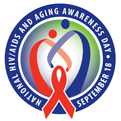 Each year on September 18th, we commemorate National HIV/AIDS and Aging Awareness Day, a chance to recognize that HIV/AIDS impacts people of all ages, including adults over 50. In fact, by the year 2020, more than 70% of people living with HIV in the United States will be age 50 or older, and 18% of new HIV diagnoses occur among people over 50. It is important to promote both HIV prevention among older adults as well as support the health and social needs of those who are living with the disease.
Each year on September 18th, we commemorate National HIV/AIDS and Aging Awareness Day, a chance to recognize that HIV/AIDS impacts people of all ages, including adults over 50. In fact, by the year 2020, more than 70% of people living with HIV in the United States will be age 50 or older, and 18% of new HIV diagnoses occur among people over 50. It is important to promote both HIV prevention among older adults as well as support the health and social needs of those who are living with the disease.
The Diverse Elders Coalition has a number of resources available on our website about HIV and aging, including our infographic, “Facts and Factors: Diverse Elders and HIV.” Did you know that among adults 50 and older, African Americans are 12x more likely than white elders to have HIV? Or that Asian American women of all ages are 20% more likely than white women to be diagnosed with HIV? These facts – as well as information about the factors that lead to these disparities – are available on our infographic and on our website.
Want more information?
- The National Asian Pacific Center on Aging (NAPCA) has an HIV/AIDS resources page with fact sheets in four different languages.
- The National Resource Center on LGBT Aging, a project of SAGE, has a number of great resources for individuals and organizations about HIV and aging in the LGBT communities.
- Resources for American Indians with HIV/AIDS can be found on the U.S. Department of Veterans Affairs website.
- Looking to get tested or find care? AIDS.gov has an HIV Testing Sites and Care Services Locator that allows you to search for testing services, housing providers, health centers and other service providers near your current location.
And if you want to help find a cure, the National Hispanic Council on Aging (NHCOA) has a great blog post about why Latinos of all ages should participate in HIV vaccine trials.
At the Diverse Elders Coalition, we envision a present where no elder has to face HIV without support, and a future where no elder has to face HIV at all. Thank you for helping us to find a cure and create a community around support and justice for elders of color, American Indian/Alaska Native elders, and LGBT elders.
The opinions expressed in this article are those of the author and do not necessarily reflect those of the Diverse Elders Coalition.

